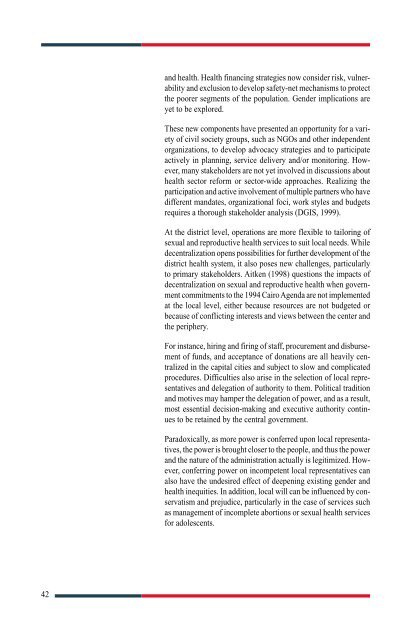Globalization, Health Sector Reform, Gender and ... - Ford Foundation
Globalization, Health Sector Reform, Gender and ... - Ford Foundation
Globalization, Health Sector Reform, Gender and ... - Ford Foundation
- No tags were found...
Create successful ePaper yourself
Turn your PDF publications into a flip-book with our unique Google optimized e-Paper software.
<strong>and</strong> health. <strong>Health</strong> financing strategies now consider risk, vulnerability<strong>and</strong> exclusion to develop safety-net mechanisms to protectthe poorer segments of the population. <strong>Gender</strong> implications areyet to be explored.These new components have presented an opportunity for a varietyof civil society groups, such as NGOs <strong>and</strong> other independentorganizations, to develop advocacy strategies <strong>and</strong> to participateactively in planning, service delivery <strong>and</strong>/or monitoring. However,many stakeholders are not yet involved in discussions abouthealth sector reform or sector-wide approaches. Realizing theparticipation <strong>and</strong> active involvement of multiple partners who havedifferent m<strong>and</strong>ates, organizational foci, work styles <strong>and</strong> budgetsrequires a thorough stakeholder analysis (DGIS, 1999).At the district level, operations are more flexible to tailoring ofsexual <strong>and</strong> reproductive health services to suit local needs. Whiledecentralization opens possibilities for further development of thedistrict health system, it also poses new challenges, particularlyto primary stakeholders. Aitken (1998) questions the impacts ofdecentralization on sexual <strong>and</strong> reproductive health when governmentcommitments to the 1994 Cairo Agenda are not implementedat the local level, either because resources are not budgeted orbecause of conflicting interests <strong>and</strong> views between the center <strong>and</strong>the periphery.For instance, hiring <strong>and</strong> firing of staff, procurement <strong>and</strong> disbursementof funds, <strong>and</strong> acceptance of donations are all heavily centralizedin the capital cities <strong>and</strong> subject to slow <strong>and</strong> complicatedprocedures. Difficulties also arise in the selection of local representatives<strong>and</strong> delegation of authority to them. Political tradition<strong>and</strong> motives may hamper the delegation of power, <strong>and</strong> as a result,most essential decision-making <strong>and</strong> executive authority continuesto be retained by the central government.Paradoxically, as more power is conferred upon local representatives,the power is brought closer to the people, <strong>and</strong> thus the power<strong>and</strong> the nature of the administration actually is legitimized. However,conferring power on incompetent local representatives canalso have the undesired effect of deepening existing gender <strong>and</strong>health inequities. In addition, local will can be influenced by conservatism<strong>and</strong> prejudice, particularly in the case of services suchas management of incomplete abortions or sexual health servicesfor adolescents.42
















